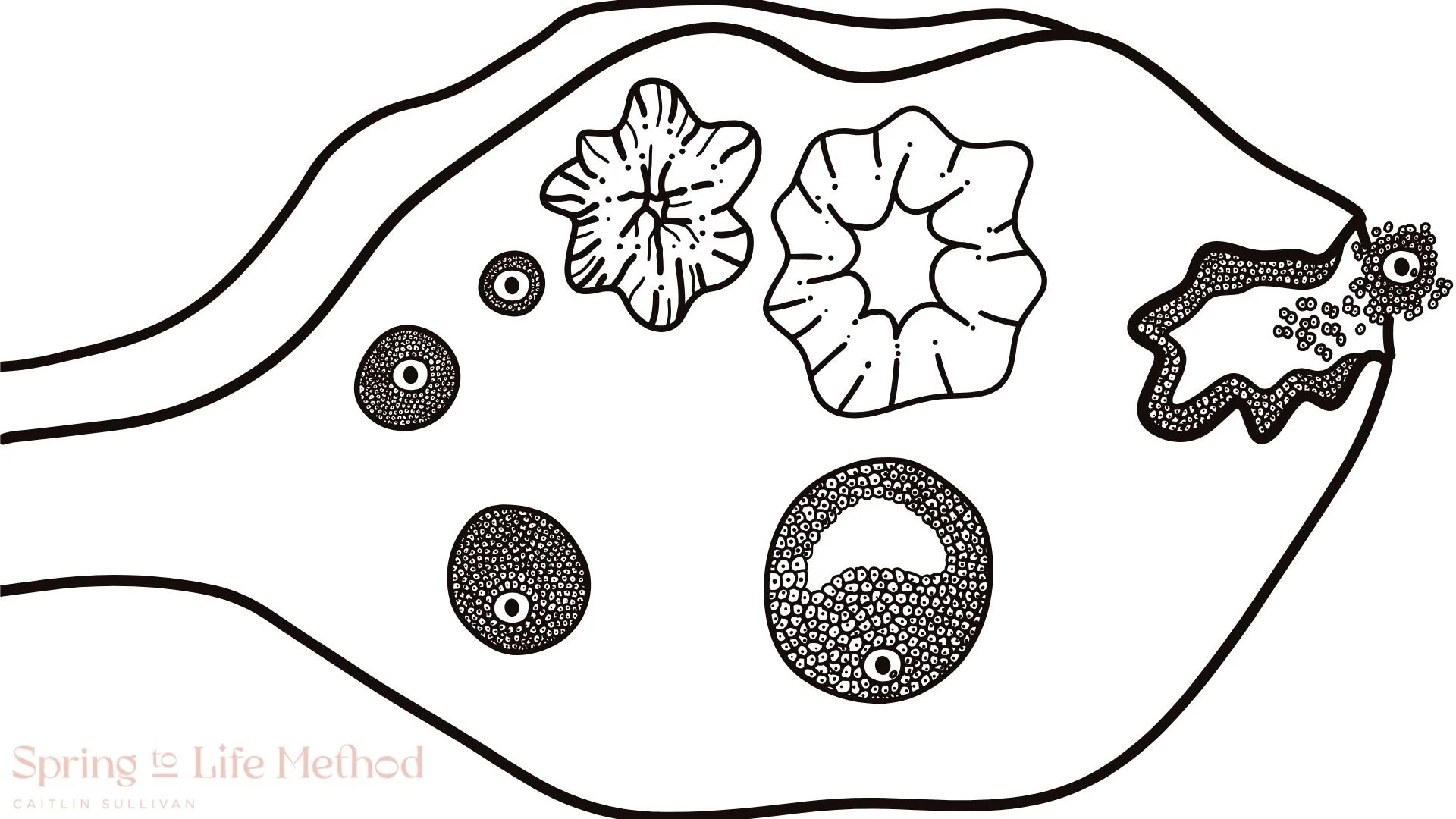Ovulation: The Main Event of Your Cycle
Most of the attention in women’s health is focused on the period bleed—but here’s the truth: your period isn’t the main event of your cycle. Ovulation is.
Why? Because ovulation is the only way your body can produce progesterone, the hormone that helps balance estrogen, reduce PMS, improve sleep, and keep your mood steady. Whether or not you want to become pregnant, ovulation matters for your overall health.
If you’ve been struggling with irregular cycles, PMS, or trouble confirming ovulation, you’re not alone. The good news is that there are simple, natural ways to support healthy ovulation—starting with food and lifestyle habits.
Why Ovulation Matters
Each cycle, your body prepares an egg for release. Once the egg leaves the ovary, the follicle transforms into a temporary endocrine gland called the corpus luteum. This gland produces progesterone for the remainder of the cycle, until it dissolves and your period begins.
No ovulation = no progesterone. And without progesterone, estrogen runs unchecked—leading to heavy bleeding, cramps, anxiety, and other symptoms we associate with PMS.
After ovulation, the follicle transforms into a temporary endocrine gland, the corpus luteum, which produces progesterone
How to Tell If You’re Ovulating
A healthy, regular period doesn’t necessarily mean you’re ovulating. In fact, it’s possible to have what’s called an anovulatory cycle—a bleed without an egg release.
Here are a few ways to confirm ovulation:
Cervical mucus changes: from slippery/stretchy (fertile) to dry/sticky
Basal body temperature rise: about 0.5-1.0°F after ovulation
Positive LH test: surge in luteinizing hormone before ovulation
Regular, healthy cycles: typically 26–35 days
If you’re unsure, tracking a few cycles with these methods can give you clarity.
Nutrients That Support Healthy Ovulation
Supporting ovulation isn’t about restriction—it’s about nourishment. Your body needs the right nutrients to support follicle development, egg quality, and hormone balance.
Here are the top nutrients for ovulation (and where to find them):
Omega-3 Fatty Acids
Reduce ovarian inflammation
Stabilize blood sugar (lowers testosterone and regulates ovulation)
Support thyroid health
Foods: fatty fish (salmon, sardines), avocado, olives (Kalamata are richest), chia and flax seeds, walnuts, olive oil, avocado oil
Omega-3 rich salmon for healthy ovulation support
Vitamin B6
Supports adrenal health
Improves uterine lining development
Boosts progesterone production
Foods: organ meats, grass-fed red meat, wild-caught fish and seafood, bananas, chickpeas
Red meat is a rich source of vitamin B6
Vitamin C
Powerful antioxidant that prevents DNA damage
Enhances iron absorption
Supports adrenal health
Improves progesterone production after ovulation
Foods: citrus fruits, bell peppers, strawberries, kiwi, brightly colored veggies
Citrus fruits are a reliable source of vitamin C
Zinc
Balances high testosterone levels
Stimulates follicle-stimulating hormone (FSH)
Improves egg quality and immunity
Foods: oysters, wild-caught shrimp, grass-fed beef and liver, pumpkin seeds, cashews, lentils, dark chocolate
Oysters are rich in zinc to support a healthy immune system and ovulation
Magnesium
Increases blood flow to the uterus
Regulates FSH and LH (key reproductive hormones)
Helps cells respond to insulin (supports blood sugar balance)
Foods: kale, avocado, pumpkin seeds, cashews, brown rice, black beans, lentils, dark chocolate
Legumes and beans are an excellent source of magnesium
Recipes for Ovulation Support
Adding these nutrients into your meals can be simple and delicious. A few ideas:
Winter Potato Salad (omega-3s + zinc)
Beef Liver Pate with fresh sage (protein + zinc)
Healthy Candied Walnuts with cinnamon and cayenne pepper (magnesium + healthy fats)
Supplements to Enhance Your Diet
Even with a nutrient-rich diet, modern agriculture and busy lifestyles can make it hard to get everything you need from food alone. That’s where high-quality supplements come in.
Magnesium – Ned’s Mellö Magnesium (three types of bioavailable magnesium + l-theanine + GABA to support stress response). Use code SPRINGTOLIFE for 15% off single orders or 20% off subscriptions.
Vitamin B Complex – Marea PMS Elixir (high-dose B6 + B12 plus other micronutrients). Use code SPRINGTOLIFE for 15% off.
Seed Cycling Packs – Funkit Wellness pre-ground seed cycling kits and cycle bites simplify daily seed cycling. Use code SPRINGTOLIFE for 20% off.
Lifestyle Support for Ovulation
Food is foundational, but lifestyle choices also play a major role in whether you ovulate consistently. Here are a few tips:
Manage stress: Cortisol can disrupt the delicate hormonal balance needed for ovulation. Incorporate breathwork, meditation, or restorative Pilates.
Balance blood sugar: Stable energy = stable hormones. Pair protein and healthy fats with carbs.
Avoid over-exercising: Too much high-intensity exercise can suppress ovulation.
Prioritize sleep: Aim for 7–9 hours to support hormone regulation and egg health.
Bringing It All Together
Ovulation is the true star of your cycle—it’s the event that sets the stage for hormone balance, healthy periods, and long-term well-being. Without it, your body can’t produce progesterone, and PMS and cycle irregularities are far more likely.
By nourishing your body with key nutrients, reducing stress, and supporting overall health, you can improve ovulation naturally.
✨ Remember: every choice you make—whether it’s adding salmon to your dinner, swapping in dark chocolate, or carving out time for rest—is an investment in your cycle three months from now.










